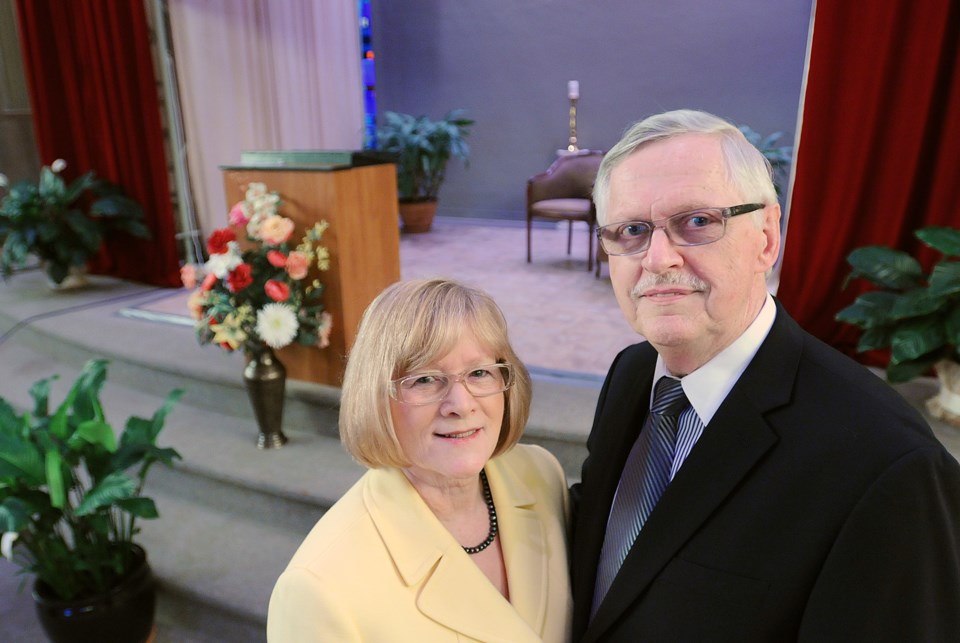On their first date more than half a century ago, Mary and Austin Hennessey were headed for a fancy restaurant. As they got to know each other’s stories, dinner was forgone for a four-and-a-half conversation in the car. Their paths were remarkably parallel.
Both had returned to their native Dublin, Ireland, a year and a half earlier. Mary had been at a convent in France studying to become a nun but the order suggested she wasn’t cut out for the religious life.
“They said that I had too much spirit in me,” she says. Austin was at a monastery in Northern Ireland preparing for a life as a priest. He chose to leave, driven by what he saw as the loneliness of the life ahead of him.
They were soon married. They remained observant Catholics and had two children, who they sent to Catholic schools. But when they decided that two was enough, the church’s doctrine on birth control was a deal-breaker.
They continued to attend church on Christmas and Easter but their spiritual eyes were beginning to wander. From the intensely Catholic Ireland, the Hennesseys migrated to Canada, first to Toronto and then quickly on to Vancouver, drawn in part by the “smorgasbord of belief systems” that were burgeoning in 1960s North America.
As they made a new life in a new land, they began exploring the Human Potential Movement, part of the counterculture consciousness-raising and social change ferment. A friend who saw the type of books the Hennesseys were reading suggested a place they should check out.
In 1968, the couple first walked through the doors of the Unity Spiritual Centre on Oak Street and everything changed. Today, the pair are ordained ministers presiding over an eclectic congregation.
Since 1964, Vancouverites have been driving by the modernist building just south of 41st Avenue with the simple sign reading “Unity,” but even the ministers acknowledge most people do not know what goes on inside.
If they did, says Austin Hennessey, the sanctuary would probably be more densely packed on Sundays.
“If you like Deepak Chopra and Eckhart Tolle, you’ll love Sundays here,” says Unity’s website. And there is no doubt that Vancouverites eat up books by these authors and others like Gary Zukav, Marianne Williamson and Wayne Dyer.
The latter recently attracted thousands to a local presentation. Unity attracts a couple of hundred most Sundays to a service heavy on music (in a structure with acclaimed acoustics), a bit of meditation and an uplifting message.
“It’s not just the guilt and shame church,” says Randy Purcell, the president of Unity’s board who recruited the Hennesseys to the pulpit less than two years ago. The pair had retired from co-ministering at another church, one of the 10 Unity-affiliated centres in B.C., but “retirement” turned out to be merely a sabbatical.
Purcell, a tech entrepreneur who joined Unity in 1981, says that Unity was “very much a prosperity church” in the 1980s, part of a spiritual movement that encouraged people’s career and wealth aspirations.
“I think over time the church and the philosophies here have gone beyond that,” he says. “Yes, you shouldn’t be worried about money all the time. You should figure out how to make a living by contributing to society that gives you a reasonable amount of comfort. But beyond that, it’s important to find happiness and to give back, to contribute, to make the world a better place.”
Purcell and the Hennesseys are emphatic that they are part of the Christian tradition, though their conversation is peppered with references to Buddha and other “wisdom teachers.”
“By studying, for example, some of the basic tenets of Buddhism, we might learn certain techniques that could help us to better live of principle taught by Jesus or by Mohammed or by the Dalai Lama,” says Purcell, who sees unity as a tradition in line with what we now call the “open source” movement. Austin Hennessy calls it “a do-it-yourself spirituality.”
And while some of the ideas and books that Unity members delve into are hot off the presses, the movement itself is more than a century old, founded in Missouri not as a religion but as a spiritual study group.
As there is no dogma, Unity adherents are free to believe what they like, to take from one tradition or another, though there is an emphasis on mysticism, elevated consciousness and the power of positive thinking.
Most, Purcell says, believe in an afterlife, but cannot say what it might look like and, besides, making the most of this life and being the best one can be is likely to put one in good stead for whatever comes next.
At root, Unity is about finding the divine in oneself. If humans are made in the image and likeness of God, says Mary Hennessy, “how can we not be divine in our nature as well? The fact that we are having a human experience doesn’t deny that we are primarily spiritual beings. That divinity in us is always there. It’s for us to discover.”
“We all have this divine potential within us,” says Austin Hennessy. “Jesus was the example, not the exception.”



